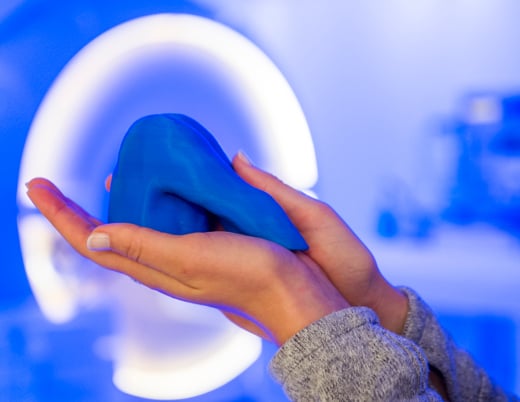Key takeaways
-
2-18% of pregnant women with anti-Ro/SSA autoantibodies develop fetal AV block.
-
There is ~ 12-hour transition period in which "emerging" fetal AV block can be treated before it becomes permanent.
-
3x -a-day, at-home fetal heart rate and rhythm monitoring by mothers can successfully detect the transition period. Prompt treatment after detection can restore normal rhythm.
Research background: Pregnant mothers with anti-Ro/SSA antibodies are at risk of developing fetal heart block
Fetal heart block (AVB) is an uncommon yet life-threatening condition that occurs in about 2% of mothers with anti-Ro/SSA (Sjogren's) antibodies.
While the fetal heart transitions from normal to un-reversible complete AVB (CAVB) or 3° AVB, it passes through 2° AVB, which is reversible. Since this transition from normal rhythm to CAVB occurs in less than 24 hours, weekly or biweekly echocardiographic surveillance rarely detects 2° AVB and the window of opportunity for treatment.
In a previous study, our researchers in the Colorado Fetal Care Center at Children's Hospital Colorado determined feasibility of fetal heart rate and rhythm monitoring (FHRM) to be done at home by mothers with a commercially available Doppler. Mothers in the study performed fetal heart rate monitoring twice per day and underwent a fetal echocardiogram within six hours of detecting an abnormal fetal heart rhythm.
The current study adds to the previous study, summarizing the results and outcomes of 273 anti-Ro/SSA pregnancies monitored at home and by echocardiography.
Study methods: Using echocardiograms and hand-held Dopplers for fetal heart rate monitoring in Sjogren's pregnancies
Sixteen centers participated in this international multicenter prospective study led by Bettina Cuneo, MD, former Director of Fetal Cardiology at Children's Colorado. Pregnant women who tested positive for anti-Ro/SSA antibodies were invited to participate.
Surveillance echocardiograms were performed weekly or biweekly (per site protocol) and diagnostic echocardiograms any time abnormal FHRM was detected during the study. The echocardiograms assessed the atrioventricular (AV) interval – which is prolonged in 1° AVB – and heart rate and looked for anti-Ro/SSA conduction system and cardiac disease. During their first office visit, participants underwent a surveillance echocardiogram and learned how to use a hand-held Doppler to monitor FHRM twice a day. They were instructed to contact their site investigator if they detected:
- Irregular heart rhythm
- Fetal heart rate of less than 100 or more than 180 beats per minute
- No fetal heart rate
Participants had the option to send audio texts of suspected abnormal heart rate to help more quickly rule out false positives. Diagnostic fetal echocardiography was performed within four to six hours of the call. If the echocardiogram diagnosed 2° fetal AV block, the participant was offered transplacental treatment. If the arrhythmia was benign or the rhythm and diagnostic echocardiogram were normal, the mothers returned to at-home FHRM and surveillance echocardiograms.
Participants also had weekly or biweekly follow-up surveillance echocardiograms (depending on study site protocol).
Study population

Diagnoses of study participants

Research results: At-home fetal heart rate and rhythm monitoring can successfully detect fetal AV block
In three fetuses, FHRM detected AVB. A prompt diagnostic fetal echocardiogram within six hours of detecting abnormal FHRM resulted in successful treatment of 2° AVB, but a 24-hour delay in diagnosis and treatment resulted in progression to irreversible 3° AVB.
During the study, no fetal AVB was missed by at-home FHRM.
Research discussion: At-home fetal heart rate and rhythm monitoring can lead to quicker, more effective treatment of fetal AV block
There were several important findings in this study, which is currently the largest surveillance study of anti-Ro/SSA positive pregnancies:
- This study confirms previous findings that at-home monitoring is feasible.
- The transition period from normal to 3° AVB is less than 24 hours and mothers can recognize the abnormal rhythm of 2° AVB.
- When treated within eight hours of detection, 2° AVB can improve to normal rhythm and babies do not need a pacemaker after birth.
Research conclusion: More fetal home surveillance monitoring research may improve fetal AV block detection and treatment
Further research into home surveillance monitoring will be able to test the hypothesis that early detection of evolving AVB could result in earlier treatment and restore 1:1 atrioventricular conduction.
Collaboration means better care, outcomes
As part of a comprehensive, multidisciplinary approach, the Colorado Fetal Care Center works collaboratively with the renowned fetal cardiology specialists at the Heart Institute at Children's Colorado. This partnership ensures top outcomes for fetal cardiac patients and allows for a lifelong continuum of care.
Refer a patient
The Colorado Fetal Care Center offers comprehensive fetal and maternal care for women facing complex or high-risk pregnancies. Contact us at CFCC@childrenscolorado.org or 1-720-777-4463.
Featured Researchers
Bettina Cuneo, MD
Fetal cardiologist





 720-777-0123
720-777-0123










